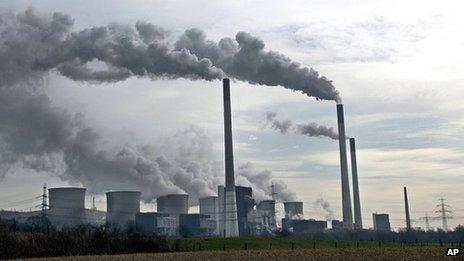German coal power revival poses new emissions threat
- Published

Is Germany's Green Revolution about to turn black with coal dust?
As the country moves away from nuclear, the builders of coal-fired power stations are moving into action.
When Chancellor Merkel announced the closure of all the country's 17 nuclear reactors by 2022, there were loud cheers from environmentalists.
But less well heard were the cheers from the coal industry.
The organisation which represents it in Europe said the change of policy meant "the prospects for coal in general, and especially for coal-fired power plants under construction or in the planning stage, have become somewhat brighter".
Poland's Prime Minister Donald Tusk, just a river's width away from Germany, was also jubilant.
"From Poland's point of view, this is a good thing not a bad one," he said.
"It means coal-based power will be back on the agenda."
Cleaner coal
And so it is.
In a worsening economic situation, Germany's new environment minister, Peter Altmaier, who is as politically close to Chancellor Angela Merkel as it is possible to get, is emphasising the importance of not weakening the economy by increasing the cost of energy.
He is also concerned that Germany should not become dependent on imports of electricity.
To that end, he is allowing the building of more coal-fired power stations.
Mr Altmaier told Die Zeit that the government was committed to fulfilling its policy of generating 35% of the country's electricity from renewable sources in the next eight years - but that still left 65%, which would have to be generated in a different way.
He said, however, that he wanted new power stations to be cleaner than the old.
They should move away from so-called "brown coal", which is a high polluter, to lower-emission types of coal, he said.
"I think it makes sense to replace old polluting lignite coal-fired power plants with modern efficient coal and gas power plants," he said.
Inefficient market
Gas is also a carbon fuel but it does produce lower emissions than coal.
It is also easier to turn a gas-fired power station on and off - and the role of coal and gas in the economy is to take up the slack when the sun does not shine or the wind does not blow to keep solar and wind power stations going.
But energy experts in Germany think that gas will not fill the gap left as nuclear winds down.
Accordingly, Professor Claudia Kemfert of the German Institute for Economic Research told the BBC that the use of coal in power generation could actually rise from the current 42% to about 50%.
The problem, as she sees it, is that the emissions trading market in Europe - whereby companies that put carbon dioxide into the atmosphere have to pay a price - is arranged so that the cost of emitting is too low.
"Gas-fired power plants would be a better alternative than coal as they produce less emissions," she said.
"And they can be more easily combined with renewable energy as they are more flexible."
But they are less economically efficient as carbon dioxide (CO2) prices are too low, Professor Kemfert insisted.
"Europe would need to increase the CO2 cap and reduce the amount of emissions. Then coal would be less attractive. As long this is not happening coal's share will increase even further".
More emissions?
There is a debate among environmentalists now about whether the move away from nuclear power will actually lead to a rise in emissions of global warming gases.
The argument is that nuclear, whatever its other drawbacks, is a low-emitter - so any carbon alternative, such as coal, must be higher.
There will without doubt be improvements in the efficiency of the economy - more output from less electricity through better machines or ways of doing things or better materials.
But that, so runs the argument, would have happened anyway - and if some coal replaces some nuclear, then emissions will have been increased compared with what would have happened without the change.
Imported coal
If the demise of nuclear does mean the return of King Coal to power, it is unlikely to be German coal.
They will be shining their shovels in Poland, South Africa and China, but not in the Ruhr.
In the 1950s, there were 607,000 miners in almost 150 mines, producing 150 million tonnes of coal.
Fifty years later, that had shrunk to just eight mines employing 33,000 miners who cut 18 million tonnes.
By now, it is down to about 20,000 miners - and falling as subsidies fade to nothing in the next five years.
A bridge too far?
The economics of energy are changing.
Not only are subsidies to coal going, but also to solar power.
And the political pressures change as economies slow down and people start to worry more about money.
Chancellor Merkel was a physicist before becoming a politician, so she knows both the scientific and the economic arguments.
And the indications are that she remains convinced that nuclear as a "bridge to the sustainable future" is now a bridge too far, so clearly the move away will happen.
But who will be the next "bridge to the sustainable future"?
Ordinary German people and businesses by using less electricity? Or perhaps Chinese coal miners? Or Polish, Czech and French nuclear power stations?
The road to the sunny, clean future is not as smooth as it seemed.
- Published30 May 2011
- Published13 July 2012
- Published23 April 2012